Please
read just enough of the history here to get a feeling of what kind of
writer Ammianus Marcellinus was. From what you read, do you think he
deserves more attention than he usually gets? Do you see any particular
strengths/weaknesses? Is the history interesting? Would you like to
read more when you get a chance?
Monday, October 6, 2025
Ammianus Marcellinus (extra credit)
Julian the Apostate (extra credit)
 Later Christian writers felt it important to answer Julian the Apostate's criticisms of Christianity in his book Against the Galileans. They quoted liberally from the book, and, partly because of their interest, we have substantial portions of a book that might otherwise have been lost.
Later Christian writers felt it important to answer Julian the Apostate's criticisms of Christianity in his book Against the Galileans. They quoted liberally from the book, and, partly because of their interest, we have substantial portions of a book that might otherwise have been lost.Read through "Against the Galileans," and cite here a line or two
Edict of Milan (extra credit)
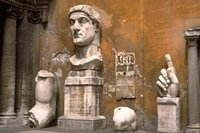 The reign of Constantine is certainly an important turning point in the history of Rome and in the history of the church. Please read through the Edict of Milan. Cite one line that particularly well shows a way in which Constantine changes things for the church.
The reign of Constantine is certainly an important turning point in the history of Rome and in the history of the church. Please read through the Edict of Milan. Cite one line that particularly well shows a way in which Constantine changes things for the church.
Constantine and his economic policies (extra credit)
 Diocletian and Constantine attempted to solve, not only the political and social problems of Rome, but also fundamental economic problems as well. Bruce Bartlett argues that the two did exactly the wrong thing. Please read Bartlett's article How Excessive Government Killed Rome. Do you think Bartlett's criticisms accurate? Why, or why not?
Diocletian and Constantine attempted to solve, not only the political and social problems of Rome, but also fundamental economic problems as well. Bruce Bartlett argues that the two did exactly the wrong thing. Please read Bartlett's article How Excessive Government Killed Rome. Do you think Bartlett's criticisms accurate? Why, or why not?
Herodian of Antioch (extra credit)
 Herodian of Antioch's History of the Roman Empire is an important source for the AD 180-238 period. Choose one of the emperors from this period (possibilities include Commodus, Pertinax, Didius Julianus, Septimius Severus, Macrinus, Bassianus, and Alexander Severus) and note what Herodian has to say about that emperor. Cite here an example of that emperor's competence (or lack thereof) and an example of the difficulties that emperor faced, looking especially for problems that emperor had with the Roman army.
Herodian of Antioch's History of the Roman Empire is an important source for the AD 180-238 period. Choose one of the emperors from this period (possibilities include Commodus, Pertinax, Didius Julianus, Septimius Severus, Macrinus, Bassianus, and Alexander Severus) and note what Herodian has to say about that emperor. Cite here an example of that emperor's competence (or lack thereof) and an example of the difficulties that emperor faced, looking especially for problems that emperor had with the Roman army.Marcus Aurelius (Extra Credit)
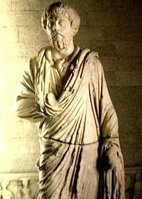 Plato said that, in an ideal society, the philosophers would be the kings, or the kings would be philosophers. Marcus Aurelius in some ways would seem to be exactly the kind of "philosopher emperor" Plato would have wanted. Please read the opening sections of Marcus Aurelius' Meditations. Choose a line that particularly well shows one of the things Aurelius particularly values, and note whether this value would make him a good emperor or not.
Plato said that, in an ideal society, the philosophers would be the kings, or the kings would be philosophers. Marcus Aurelius in some ways would seem to be exactly the kind of "philosopher emperor" Plato would have wanted. Please read the opening sections of Marcus Aurelius' Meditations. Choose a line that particularly well shows one of the things Aurelius particularly values, and note whether this value would make him a good emperor or not.
Suetonius' Lives of the Caesars (extra credit)
 Suetonius' Lives of the Caesars is one of the most important sources for the period following Nero's Death. Among his "Twelve Caesars" are Galba, Otho, Vitellius, Vespasian, Titus, and Domitian Suetonius includes all sorts of fascinating biographical details about the men he describes--along with plenty of sometimes unverifiable gossip and rumor.
Suetonius' Lives of the Caesars is one of the most important sources for the period following Nero's Death. Among his "Twelve Caesars" are Galba, Otho, Vitellius, Vespasian, Titus, and Domitian Suetonius includes all sorts of fascinating biographical details about the men he describes--along with plenty of sometimes unverifiable gossip and rumor.For extra credit, please read Suetonius account of any one of the caesars of this period (links above) . Pick an incident from the life of this caesar that shows a way in which Augustus' system (the Principate) can work well, or an incident that shows that system created by Augustus was not working out particularly well.
If you have fallen behind on your blogs, you can add to your extra credit by doing an extra blog entry on a *different* ceasar than you talk about in your first post.
Selections from Tacitus' Histories (Extra Credit)
 Most of the historical works written by the Romans disappeared long ago. But while other books were lost, Tacitus' works survived--though, sometimes, just barely. Can you guess why this might later figures thought the works of Tacitus worth preserving? Please read the first few paragraphs of Tacitus' Histories, and see if you can find a line or two that explains the appeal of Tacitus and his approach to history.
Most of the historical works written by the Romans disappeared long ago. But while other books were lost, Tacitus' works survived--though, sometimes, just barely. Can you guess why this might later figures thought the works of Tacitus worth preserving? Please read the first few paragraphs of Tacitus' Histories, and see if you can find a line or two that explains the appeal of Tacitus and his approach to history.
Ovid
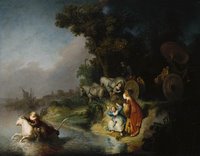 Most of the Greek and Roman myths you read in high school were re-tellings of stories from Ovid's Metamorphoses. Choose your favorite myth and read Ovid's version of that myth. Read also one of the Ovid myths that you *hadn't* read before. Cite one example for each myth that shows particularly well Ovid's "insight into the human condition."
Most of the Greek and Roman myths you read in high school were re-tellings of stories from Ovid's Metamorphoses. Choose your favorite myth and read Ovid's version of that myth. Read also one of the Ovid myths that you *hadn't* read before. Cite one example for each myth that shows particularly well Ovid's "insight into the human condition."If you want to get the overall picture of the Metamorphoses, see this excellent introduction and commentary by Larry Brown.
Virgil
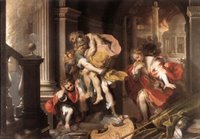 Please read this summary of Virgil's Aeneid. Then read as much as you can of Book I and Book II. Skimming through Book I is sufficient. Please read Book II with a bit more care.
Please read this summary of Virgil's Aeneid. Then read as much as you can of Book I and Book II. Skimming through Book I is sufficient. Please read Book II with a bit more care.Cite a line or two from Book I or Book II that particularly well show Virgil's "insight into the human condition," i.e., that shows his understanding of subjects like fate, the relationships between men and women, relationships between men and gods, the impact of war, etc.
Augustus and Julio-Claudians
 Suetonius' Lives of the Caesars is one of the most important sources for the early days of the Principate. Suetonius includes all sorts of fascinating biographical details about the men he describes--along with plenty of sometimes unverifiable gossip and rumor.
Suetonius' Lives of the Caesars is one of the most important sources for the early days of the Principate. Suetonius includes all sorts of fascinating biographical details about the men he describes--along with plenty of sometimes unverifiable gossip and rumor.Please read Suetonius' account of Augustus, Tiberius, Gaius (Caligula), Claudius, or Nero. Pick a line that illustrates particularly well either the emperor's achievements or the way in which that emperor's life was a personal tragedy, or a tragedy for the people of Rome. Explain your choice.
Res Gestae Divi Augusti (extra credit blog)
One of the best ways to understand Augustus Caesar is to to look a the The Res Gestae Divi Augusti, his own summary of his achievements.
What kinds of things is Augustus proud of? What particularly impresses you? What insights do you get into Augustus' personality? Are there any suggestions of tragedy here?
The 2nd Triumvirate
 Please read this abridged edition of Plutarch's Life of Antony. Pick out a line or several lines that seem to you particularly good examples of action, drama, romance, or "game show" in the story of the 2nd Triumvirate. Explain your choice. How do these lines show action, drama, romance--or the game show atmosphere?
Please read this abridged edition of Plutarch's Life of Antony. Pick out a line or several lines that seem to you particularly good examples of action, drama, romance, or "game show" in the story of the 2nd Triumvirate. Explain your choice. How do these lines show action, drama, romance--or the game show atmosphere?
If you prefer, you can read the abridged edition of Plutarch's Life of Marcus Brutus. Again, you can talk about elements of actions, drama, romance or the "game show" atmosphere of the 2nd Triumvirate.
Caesar the God (extra credit)
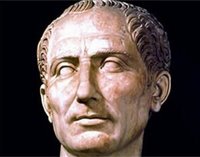 Two years after his death, the Roman Senate declared Caesar a god. This gave Roman biographers the unusual task of recounting the life of a man who was, by official proclamation, a divine being. By the time the biographer Suetonius writes his Life of the Deified Julius, the Roman people has worshiped Caesar as a god for more than 150 years. Please read through Divus Julius, and pick out a line that shows especially well why the Roman people might have accepted Caesar as divine or a line that shows that regarding Caesar as a god was more than a little strange. Explain your choice.
Two years after his death, the Roman Senate declared Caesar a god. This gave Roman biographers the unusual task of recounting the life of a man who was, by official proclamation, a divine being. By the time the biographer Suetonius writes his Life of the Deified Julius, the Roman people has worshiped Caesar as a god for more than 150 years. Please read through Divus Julius, and pick out a line that shows especially well why the Roman people might have accepted Caesar as divine or a line that shows that regarding Caesar as a god was more than a little strange. Explain your choice.
Caesar as General and Politician
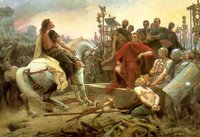 Please skim through Plutarch's Life of Caesar. Pick out a section that particularly well shows Caesar's ability and his versatility or a section that shows particularly well why Caesar is such a controversial figure. Explain your choice.
Please skim through Plutarch's Life of Caesar. Pick out a section that particularly well shows Caesar's ability and his versatility or a section that shows particularly well why Caesar is such a controversial figure. Explain your choice.Some of you might find particularly interesting the accounts of Caesar's battles, something I don't talk about in class much. Note Sections 15-20, for instance, a summary of Caesar's campaign in Gaul.
How often do you think About Rome (extra credit blog)
You may have come across the recent (well, not that recent anymore) discussion of how often men think about Rome. Here's a chance for you to weigh in. How often do you think about Rome? Why?
Crassus, Pompey, and Their Contemporaries (Blog for Tuesday, 10/3)
 Please read Plutarch's account of one of the many "ambitious young men" who lived during what is sometimes called the Age of Cicero. Pick out a key line that shows how this man's work might have tended to support or destroy republican government in Rome. Explain why you chose this particular line.
Please read Plutarch's account of one of the many "ambitious young men" who lived during what is sometimes called the Age of Cicero. Pick out a key line that shows how this man's work might have tended to support or destroy republican government in Rome. Explain why you chose this particular line.You can use one of these abridged biographies of Crassus, Cicero, Pompey, Sertorius, Cato the Younger, or Lucullus. If you prefer the complete text, go to the links in the right hand column here (scroll down a bit).

